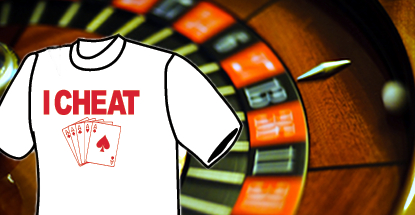 It’s been a bad summer if you’re a casino cheat. On Tuesday, 40-year-old Cleveland native Vaughan Perry was indicted on charges he’d engaged in sketchy activity on 139 separate occasions at Horseshoe Casino Cleveland. The Ohio Casino Control Commission said Perry was caught cheating at the Horseshoe’s blackjack tables in May, but a subsequent review of surveillance camera footage showed Perry had been punking the ‘Shoe for some time. The most serious of Perry’s charges, a single count of grand theft, alleges that he gained over $8k in illegal winnings. Perry is set to be arraigned on Sept. 3.
It’s been a bad summer if you’re a casino cheat. On Tuesday, 40-year-old Cleveland native Vaughan Perry was indicted on charges he’d engaged in sketchy activity on 139 separate occasions at Horseshoe Casino Cleveland. The Ohio Casino Control Commission said Perry was caught cheating at the Horseshoe’s blackjack tables in May, but a subsequent review of surveillance camera footage showed Perry had been punking the ‘Shoe for some time. The most serious of Perry’s charges, a single count of grand theft, alleges that he gained over $8k in illegal winnings. Perry is set to be arraigned on Sept. 3.
Over in Connecticut, a 55-year-old man has pled guilty to marking cards with invisible ink at the Mohegan Sun casino. Last September, New Jersey resident Bruce Koloshi was caught doctoring cards at the Mohegan poker tables, following a similar incident at the L’Auberge Casino in Mississippi the previous month. In exchange for agreeing to cooperate with authorities in the Mississippi case and to steer clear of Connecticut casinos for three years, Koloshi was sentenced to time served.
WHEN IS CHEATING NOT CHEATING?
In Pennsylvania, a former roulette dealer at the Meadows Casino has been charged with conspiracy for daring to tell a gambler his lucky number. In what may be an industry first, Robert Valle was arrested in June and charged with conspiracy and ‘using illegal methods to win a bet’ after he told a gambler that his (Valle’s} lucky number was four and that he’d tried to aim the ball to make it more likely that it would land on four.
Court documents say a confidential informant recorded Valle making the claim but Valle has since stated that he was only trying to establish a rapport with the gamblers at his table and that he had no ability to make any number come up lucky. “If I could do something like that, I’d have everybody and my brother coming in.” Triblive.com reported that Valle’s co-workers held a ‘4 Freedom’ fundraiser for him on Aug. 10 to help pay his legal bills.
MANDATORY FINES FOR CASINO THIEVES UNCONSTITUTIONAL
It wasn’t all bad news for those who flout the rules. A former dealer at Pennsylvania’s Rivers Casino is smiling after the state Supreme Court declared the mandatory $75k fine imposed on casino thieves to be unconstitutional. Back in 2010, Matthew Eisenberg was caught pocketing $200 worth of chips from the casino table at which he was working, leading to him being charged with misdemeanor theft under the state’s Gaming Act. He pled guilty the following year and was given a year of probation and a $75k fine, the amount of which was automatically imposed under the terms of the Act.
Eisenberg’s attorney argued that the Act’s mandatory fine was way out of proportion to the scale of his client’s misdeeds and argued that the Legislature had “placed the casino above everybody else in Pennsylvania.” Eisenberg appealed on the grounds that the fine was “irrational and unreasonable.” On Tuesday, the Supreme Court unanimously agreed, calling the fine “strikingly disproportionate to the manner in which other crimes are punished in Pennsylvania.” Chief Justice Ronald Castille noted that a $200 theft from a non-casino business wouldn’t result in anything near Eisenberg’s fine and stated that the mandatory nature of the fine “merely exacerbates the disproportion.”
